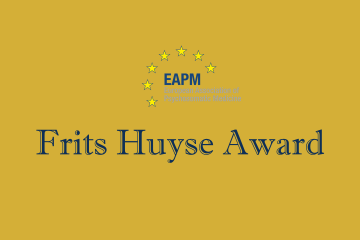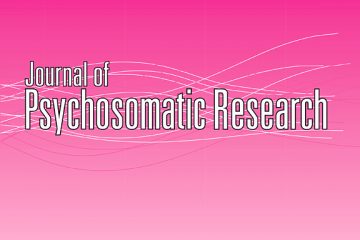Prof James Levenson receives the Alison Creed Award 2022.
Read the interview with Prof James Levenson on the Alison Creed Award 2022 and find out more below.
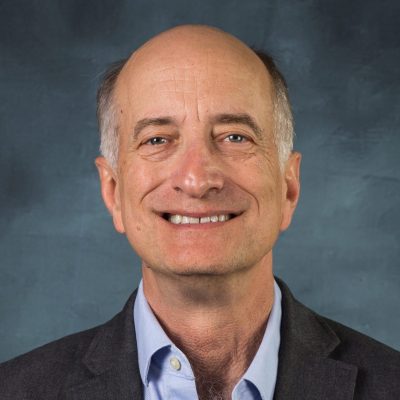
Prof James Levenson
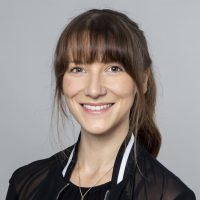
Dr. Natalie Uhlenbusch
The interview with Prof James Levenson was conducted by Dr Natalie Uhlenbusch on March 1st, 2022.
Natalie Uhlenbusch: You won the Alison Creed Award for your outstanding life time achievements in the field of Psychosomatic Medicine / Consultation Liaison Psychiatry – Congratulations!
With over 200 papers and book chapters as well as seven books and several awards in teaching and research, you are a true luminary in the field of psychosomatic medicine/consultation liaison psychiatry. When and why did you decide that you wanted to dedicate your work to this subject?
James Levenson: Well, I already had some interests in psychology in college. I was very much a science student; I took a course in which in 10 weeks we read 3000 pages of Freud. So I entered medical school very interested in the interface between psychology and medicine. But I was uncertain if I wanted to be a pediatrician who knew a lot of psychiatry or a child psychiatrist who knew a lot about pediatrics, or an internist with a lot of knowledge in psychiatry or a psychiatrist with a lot of knowledge in internal medicine. And during my pediatric rotation I found routine pediatrics boring, and many of the interesting cases too upsetting, so I decided that it’s got to be somewhere between internal medicine and psychiatry. Then I started out in an internal medicine residency and after a year switched into psychiatry. I realized that consultation liaison psychiatry and psychosomatics was a way of having a foot in both worlds. I also knew a personal trait of mine, and there’s a positive and a negative way to look at this trait, like most human traits. The positive perspective is that I have very diverse interests. The negative perspective is that I get bored doing just one thing. Consultation liaison psychiatry was also a way then to align my career with my personality.
Are there any moments in your career so far that have been particularly memorable for you?
That’s a hard question because there have been so many! It was very gratifying to lead the way in getting consultation liaison psychiatry recognized as an official subspecialty of psychiatry in the U.S. It was a tremendous honor to be chosen as an editor of Journal of Psychosomatic Research. There are many other memorable moments, such as the publication of the first edition of my Textbook on Psychosomatic Medicine, that certainly was very gratifying.
A personal memory, which is in some ways is a small thing but at the same time it is not a small thing, was the very first time I came to the EAPM. It was actually still a predecessor organization then and the meeting was in Berlin and Wolfgang Söllner was the host. And I was nervous about coming to Germany because I am Jewish and my parents wanted nothing to do with anything German – I am sure you can understand. But there at that meeting, Wolfgang had arranged a special session on psychiatrists’ complicity with the Nazis and I felt very much welcomed and at home. And this was the start of a friendship with Wolfgang and a number of other European psychiatrists which has been very important for me.
Thinking back to the moment when you graduated from medical school at the University of Michigan, has your professional journey turned out the way you had imagined it?
You know, I think it has, although I have never been one to have a 5-year plan, I just let things evolve kind of organically. And in that way I was influenced by my father who was a famous nuclear engineer. He had this amazing career and I asked him how it had happened and he said he never planned anything, he just tried to do good work and opportunities came his way. And that is how my career has unfolded, too. I just tried to do what was interesting and tried to do a good job and opportunities came my way, but I never really had an exact vision.
Is there anything that you would recommend to young scientists in the field?
Well, I think that there was a time in academic medicine when one could try to do everything, be a clinician, be a teacher, be a researcher. In fact, at least in the US back then, being an expert in all those things was called being a triple threat, which is actually a sports metaphor. But it’s really not possible to have equal excellence in all those things and so you have to make some choices and decide what it is that gives you the greatest pleasure. I actually have not fulfilled my research potential because I have devoted so much time to clinical work and teaching. And I am happy with that but it did require some decisions along the way, which were the right decisions for me but would not have been the right ones for everyone.
And what did you base these decisions on?
If I’m being honest, it was a mixture of not wanting to be too narrowly focused, not wanting to give up or greatly reduce my clinical work and teaching but also some anxiety about putting all my eggs in one basket. It made me too nervous to put all my eggs in the basket of applying for grants. Anxiety played a role in staying involved in research but also staying very committed clinically and in teaching.
Are there any exciting current projects that you would like to tell us about?
I am excited that at my age I am still well enough to be just as busy as I’ve ever been, teaching, seeing patients. Most of my colleagues don’t know that in addition to the other things I do, I have chaired our health systems’ ethics committee for 33 years and I provide most of the ethics consultations in the hospital. And I am excited to be able to continue to assist my colleagues with difficult cases whether complex psychiatric cases or in ethical dilemmas. So yeah, I am just happy that I can continue doing all the things I did before.
One of your research interests are psychiatric disorders in the medically ill. Based on your clinical and research experience, what is essential in maintaining mental health despite a physical condition? What can and should we as healthcare professionals do to support patients in the best possible way?
That’s a book!
Well, I think one of the things that is relevant on an organizational level – I don’t know much about medical education in other countries – but if I were in charge of the education of medical students and residents, I think programs should reflect the proportion of psychopathology, psychiatric problems and psychological distress that they will encounter in their patients. And it’s far from that. One can go through internal medical training in the United States and learn nothing about psychiatry. And yet, depression is the most common diagnosis they will end up treating in primary care. I think one of the things we have to do is try to break down the barriers between the disciplines. Too many psychiatrists come out of their training not feeling very comfortable with their medical knowledge. But non-psychiatrists – at least in the US – their level of knowledge about the most common things, such as delirium, dementia, schizophrenia depression etc., is terribly limited and that’s a major educational failure.
We live in turbulent and somewhat disturbing times we live in. The war in Ukraine, the COVID-19 pandemic, the climate crisis, all these are threats that can have a significant impact on physical and mental health. What role do such political events play in the context of your work?
Until Donald Trump was elected president in the US, I was very careful to be politically neutral with my patients and to never discuss politics with them. They were not there to discuss politics but to receive care. I also didn’t want my politics to be visible to patients because I wanted to be able to take care of every kind of patient regardless of their political or religious views. But during Trump’s presidency, there was widespread endorsement by him and other leaders of racism, sexism, xenophobia, homophobia… and I decided that I could not be silent in the face of those things when they would come up with a patient. And that’s because those aren’t political issues alone; those are social diseases. And I remember all the way back in medical school, reading about Virchow, who was the founder of modern pathology, and he also was in many ways the founder of public health medicine, and he said that it was a physician’s responsibility to address the social causes of diseases. By the way, he lost his university position because he was a communist and used his position very publicly to advocate for better working and living conditions for poor people. So I think things like what’s going on in Ukraine force all of us to confront these questions. There are some things to be silent in the face of means to tacitly endorse them.
At the EAPM 2022 Vienna Conference, Prof James Levenson will give a plenary lecture on “A History of Consultation-Liaison Psychiatry in America: A Personal Perspective. He will also give a masterclass on “Psychopharmacology in the Medically Ill”.
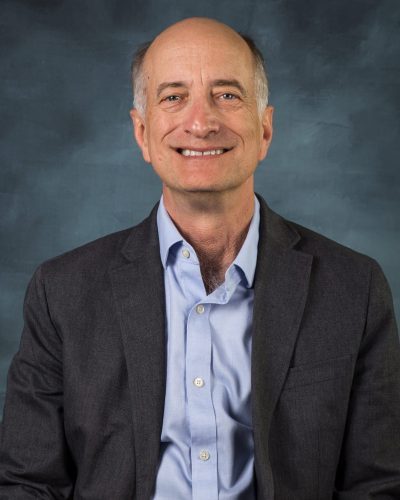
Prof James Levenson
Dr. Levenson is the Rhona Arenstein Professor of Psychiatry, as well as Professor of Medicine and Surgery at the Virginia Commonwealth University School of Medicine, where he is also Chair, Division of Consultation-Liaison Psychiatry, and Vice-chair, Department of Psychiatry. He has published over 240 papers and book chapters, and seven books, including The American Psychiatric Publishing Textbook of Psychosomatic Medicine and Consultation-Liaison Psychiatry, Clinical Manual of Psychopharmacology in the Medically Ill, and Psychiatry Essentials for Primary Care.
He is past president of the Academy of Consultation-Liaison Psychiatry. He served as the inaugural chair of the American Board of Psychiatry and Neurology’s Committee for Subspecialization in Consultation-Liaison Psychiatry from 2003-2018. He was a member of the DSM-5 and DSM-5-TR Work Groups on Somatic Symptom Disorders, and now serves on a DSM-5.1 committee. He is an editor emeritus of the Journal of Psychosomatic Research and is a member of its editorial board as well as Psychological Medicine. He has served on the National Board of Medical Examiners’ USMLE 3 Committee, and its Post-Licensure Assessment Committee. In his university’s health system, he has chaired the Ethics Committee for the past 33 years and has served on the boards of the Clinical Practice Plan, the Malpractice Plan, and the Health System’s Medicaid HMO. He has received his Medical School’s and his University’s highest teaching awards, as well as his Health System’s highest award as a clinician. He received the Thomas and Eleanor Hackett Award from the Academy of Consultation-Liaison Psychiatry, and a Lifetime Achievement Award from the Society for Liaison Psychiatry.
Dr. Levenson attended medical school at the University of Michigan, followed by internal medicine internship at the University of Oregon, psychiatric residency at the University of Colorado, and consultation-liaison psychiatry fellowship at Westchester County Medical Center. He is board-certified in Psychiatry and Consultation-Liaison Psychiatry.
[/su_spoiler]